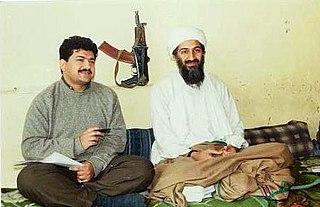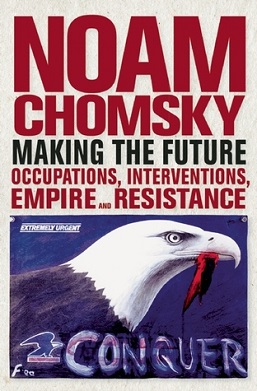
Al-Qaeda is a pan-Islamist militant organization led by Sunni Jihadists who self-identify as a vanguard spearheading a global Islamist revolution to unite the Muslim world under a supra-national Islamic state known as the Caliphate. Its members are mostly composed of Arabs, but also include people from other ethnic groups. Al-Qaeda has mounted attacks on civilian, economic and military targets of the US and its allies; such as the 1998 US embassy bombings, the USS Cole bombing and the September 11 attacks. The organization is designated as a terrorist group by NATO, UN Security Council, the European Union, and various countries around the world.

Osama bin Mohammed bin Awad bin Laden was a Saudi-born Islamic dissident and militant leader who was the founder and first general emir of al-Qaeda from 1988 until his death in 2011. Ideologically a pan-Islamist, his organization is designated as a terrorist group by the United Nations Security Council, the North Atlantic Treaty Organization (NATO), the European Union, and various other countries. He is most widely known as the mastermind of the September 11 attacks in the United States.

The bin Laden family, also spelled bin Ladin, is a wealthy family intimately connected with the innermost circles of the Saudi royal family. It is the namesake and controlling shareholder of Saudi Binladin Group, a multinational construction firm. Following the September 11 attacks, the family became the subject of media attention and scrutiny through the activities of Osama bin Laden, the former head of al-Qaeda.

William Henry Blum was an American author and journalist and a critic of United States foreign policy.
Jamal Ahmed al-Fadl is a Sudanese militant and former associate of Osama bin Laden in the early 1990s. Al-Fadl was recruited for the Afghan war through the Farouq mosque in Brooklyn. In 1988, he joined Al-Qaeda and took an oath of fealty to Bin Laden. After a dispute with Bin Laden, al-Fadl defected and became an informant to the United States government on al-Qaeda's activities.

The September 11 attacks, commonly known as 9/11, were four coordinated Islamist suicide terrorist attacks carried out by al-Qaeda against the United States in 2001. That morning, 19 terrorists hijacked four commercial airliners scheduled to travel from the New England and Mid-Atlantic regions of the East Coast to California. The hijackers crashed the first two planes into the Twin Towers of the World Trade Center in New York City, two of the world's five tallest buildings at the time, and aimed the next two flights toward targets in or near Washington, D.C., in an attack on the nation's capital. The third team succeeded in striking the Pentagon, the headquarters of the U.S. Department of Defense in Arlington County, Virginia, while the fourth plane went down in rural Pennsylvania during a passenger revolt. The attacks killed nearly 3,000 people and instigated the multi-decade global war on terror.
Osama bin Laden, the founder and former leader of al-Qaeda, went into hiding following the start of the War in Afghanistan in order to avoid capture by the United States and/or its allies for his role in the September 11, 2001 attacks, and having been on the FBI Ten Most Wanted Fugitives list since 1999. After evading capture at the Battle of Tora Bora in December 2001, his whereabouts became unclear, and various rumours about his health, continued role in al-Qaeda, and location were circulated. Bin Laden also released several video and audio recordings during this time.

The Battle of Tora Bora was a military engagement that took place in the cave complex of Tora Bora, eastern Afghanistan, from November 30 – December 17, 2001, during the final stages of the United States invasion of Afghanistan. It was launched by the United States and its allies with the objective to capture or kill Osama bin Laden, the founder and leader of the militant organization al-Qaeda. Al-Qaeda and bin Laden were suspected of being responsible for the September 11 attacks three months prior. Tora Bora is located in the Spīn Ghar mountain range near the Khyber Pass. The U.S. stated that al-Qaeda had its headquarters there and that it was bin Laden's location at the time.

On May 2, 2011, Osama bin Laden, the founder and first leader of the Islamist militant group al-Qaeda, was shot and killed at his compound in the Pakistani city of Abbottabad by United States Navy SEALs of SEAL Team Six. The operation, code-named Operation Neptune Spear, was carried out in a CIA-led mission, with the Joint Special Operations Command (JSOC) coordinating the Special Mission Units involved in the raid. In addition to SEAL Team Six, participating units under JSOC included the 160th Special Operations Aviation Regiment (Airborne), also known as the "Night Stalkers," and the CIA's Special Activities Division, which heavily recruits from former JSOC Special Mission Units. The success of the operation ended a nearly decade-long manhunt for bin Laden, who was accused of masterminding the September 11 attacks on the United States.

Hamza bin Osama bin Mohammed bin Awad bin Laden, better known as Hamza bin Laden, was a Saudi Arabian-born member of Al-Qaeda. He was a son of Al-Qaeda leader Osama bin Laden, and, following his father's death in 2011 and the attacks on the World Trade Center in New York City, he was described as an emerging leader of the Al-Qaeda organization.
Osama bin Laden, a militant Islamist and reported founder of al-Qaeda, in conjunction with several other Islamic militant leaders, issued two fatawa – in 1996 and then again in 1998—that military personnel from the United States and allied countries until they withdraw support for Israel and withdraw military forces from Islamic countries. He was indicted in United States federal court for his alleged involvement in the 1998 U.S. embassy bombings in Dar es Salaam, Tanzania and Nairobi, Kenya, and was on the U.S. Federal Bureau of Investigation's Ten Most Wanted Fugitives list until his death.

Osama bin Laden took ideological guidance from prominent militant Islamist scholars and ideologues from the classical to contemporary eras, such as Ibn Taymiyya, Ibn al-Qayyim al-Jawziyyah, Sayyid Qutb and Abdullah Azzam. During his middle and high school years, bin Laden was educated in Al-Thager Model School, a public school in Jeddah run by Islamist exiles of the Muslim Brotherhood; during which he was immensely influenced by pan-Islamist ideals and displayed strict religious commitment. As a teenager, bin Laden attended and led Muslim Brotherhood-run "Awakening" camps held on desert outskirts that intended to raise the youth in religious values, instil martial spirit and sought spiritual seclusion from "the corruptions" of modernity and rapidly urbanising society of the 1970s in Saudi Arabia.

Ghost Wars: The Secret History of the CIA, Afghanistan, and Bin Laden, from the Soviet Invasion to September 10, 2001, abbreviated as Ghost Wars, is a book written by Steve Coll, published in 2004 by Penguin Press. It won the 2005 Pulitzer Prize for General Non-Fiction.
This is a list of writings published by the American author Noam Chomsky.

The September 11 attacks were carried out by 19 hijackers of the Islamist militant organization al-Qaeda. In the 1990s, al-Qaeda leader Osama bin Laden declared a holy war against the United States, and issued two fatāwā in 1996 and 1998. In the 1996 fatwā, he quoted the Sword Verse. In both of these fatāwā, bin Laden sharply criticized the financial contributions of the American government to the Saudi royal family as well as American military intervention in the Arab world.
Since the early 1990s, several interviews of Osama bin Laden have appeared in the global media. Among these was an interview by Middle East specialist Robert Fisk. In the interviews, Bin Laden acknowledges having instigated bombings in Khobar and Riyadh, but denies involvement with both the 1993 and 2001 attacks on the WTC towers in New York.

On May 2, 2011, United States President Barack Obama confirmed that al-Qaeda leader Osama bin Laden had been killed in his compound in Abbottabad, northeastern Pakistan. Bin Laden's death was welcomed by many as a positive and significant turning point in the fight against al-Qaeda and related groups. Those who welcomed it included the United Nations, European Union, NATO, and some nations in Asia, Africa, Oceania, South America, and the Middle East, including Yemen, Lebanon, Saudi Arabia, India, Israel, Indonesia, Somalia, the Philippines, Turkey, Iraq, Australia, Argentina, and the rebel Libyan Republic.

The death of Osama bin Laden on May 2, 2011, gave rise to various conspiracy theories, hoaxes and rumors. These include the ideas that he had died earlier, or that he lived beyond the reported date. Doubts about Bin Laden's death were fueled by the U.S. military's supposed disposal of his body at sea, the decision to not release any photographic or DNA evidence of Bin Laden's death to the public, the contradicting accounts of the incident, and the 25-minute blackout during the raid on Bin Laden's compound during which a live feed from cameras mounted on the helmets of the U.S. special forces was cut off.

Making the Future: Occupations, Interventions, Empire and Resistance is a 2012 collection of political op-ed columns written by Noam Chomsky and edited by John Stickney for monthly publication by the New York Times Syndicate between April 2, 2007, and October 31, 2011. The columns, according to Stickney, "present a narrative of the events that have made the future since 2007," including War in Afghanistan and Iraq, the 2008 U.S. presidential race; the Chinese Century, the pink tide, nuclear proliferation, the Gaza War, Israeli settlement, climate change, the global financial crisis, the Arab Spring, the death of Osama bin Laden and the Occupy movement.
The following is an outline of the series of events that led up the War in Afghanistan (2001–2021).












